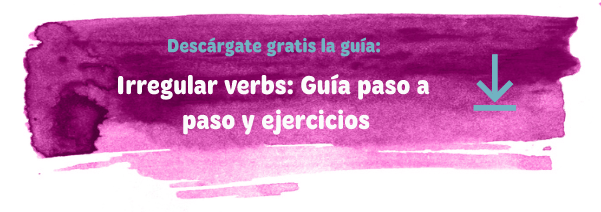What's Up! blog
el mejor contenido del mejor curso de inglés
Talk en pasado: conjugaciones y ejemplos
Hablando inglés es seguro que necesitarás utilizar el verbo del que trata este post: el verbo talk, que precisamente significa hablar. Es importante conocer las diferentes formas de talk en pasado, y los usos de cada una de ellas. Sigue leyendo y descúbrelas.
Cómo conjugar talk en pasado
El significado de talk es hablar, dialogar, conversar. Se usa para una conversación entre dos o más interlocutores. Se pronuncia ‘tok’, alargando un poco la -o.
Simple past
Al ser un verbo regular, talk en pasado se forma añadiendo la partícula -ed.
Past · Pasado
I talked · yo hablé.
You talked · tu hablaste.
She/he talked · ella/él habló.
We talked · nosotras/os hablamos.
You talked · vosotras/os hablásteis.
They talked · ellas/os hablaron.
- I talked to Susan about my job last week – (Yo) hablé con Susan sobre mi trabajo.
- Claire talked with Hannah and convinced her to come – Claire habló con Hannah y la convenció de venir.
- When was the last time you talked to Dillon? – ¿Cuándo fue la última vez que hablaste con Dillon?
- I know they talked with you. – Sé que ellas/os hablaron contigo.
Existen otros tiempos pasados, que se forman incluyendo verbos auxiliares y formas compuestas.
Past perfect
El pasado perfecto se usa para referirse a algo que ha ocurrido en el pasado, antes de que ocurriera otra cosa. Se forma con el pasado del auxiliar have + el participio de talk.
Past Perfect · Pasado perfecto
I had talked · yo había hablado.
You had talked · tú habías hablado.
She/he had talked · ella/él había hablado.
We had talked · nosotras/os habíamos hablado.
You had talked · vosotras/os habíais hablado.
They had talked · ellas/os habían hablado.
- We had talked a lot about it before they arrived – (Nosotras/os) habíamos hablado mucho sobre ello antes de que ellas/os llegaran.
- I had talked with Molly before the party began – (Yo) había hablado con Molly antes de que empezara la fiesta.
- Mia had talked with her friends just before the landing – Mia había hablado con sus amigos justo antes del aterrizaje.
- They had talked about leaving, and then the phone rang – (Ellas/os) habían hablado de irse, y entonces sonó el teléfono.
Past continuous
El pasado continuo se usa para referirse a acciones que estaban pasando en un momento específico del pasado.
Past continuous · Pasado continuo
I was talking · yo estaba hablando.
You were talking · tu estabas hablando.
She/he was talking · ella/él estaba hablando.
We were talking · nosotras/os estábamos hablando.
You were talking · vosotras/os estabais hablando.
They were talking · ellas/os estaban hablando.
- I was talking with my sister when they called – (Yo) estaba hablando con mi hermana cuando ellas/os llamaron.
- They were talking about the presents when I met them – (Ellas/os) estaban hablando de los regalos cuando me los encontré.
- We were talking with my cousins at that time – (Nosotras/os) estábamos hablando con mis primos a esa hora/en ese momento.
- Henry was talking to the lawyer the moment he realized it was too late – Henry estaba hablando con el abogado en el momento en que se dio cuenta de que era demasiado tarde.
Past perfect continuous
El pasado perfecto continuo se usa para hablar de una acción que estaba ocurriendo en el pasado, antes que tuviera lugar otra acción que la interrumpió.
Past perfect continuous · Pasado perfecto continuo
I had been talking · (yo) había estado hablando.
You had been talking · (tu) habías estado hablando.
She/he had been talking · (ella/él) había estado hablando.
We had been talking · (nosotras/os) habíamos estado hablando.
You had been talking · (vosotras/os) habíais estado hablando.
They had been talking · (ellas/os) habían estado hablando.
Las dos acciones ocurridas en el pasado se diferencian usando el pasado perfecto continuo para la acción que estaba en proceso, y el pasado simple para la acción que la interrumpió.
- We had been talking with them the whole morning but then someone came in and we had to stop – (Nosotras/os) habíamos estado hablando con ellas/os toda la mañana pero entonces alguien entró y tuvimos que parar.
- Maria had been talking to me about her mum for twenty minutes when she showed up – Maria me había estado hablando sobre su madre durante veinte minutos cuando ella apareció.
También se utiliza para mostrar la relación causa-efecto en el pasado.
- They were happy visiting grandma because they had been talking about visiting her since last summer – (Ellas/os) estaban felices visitando a la abuela porque habían estado hablando sobre visitarla desde el pasado verano.
- I had been talking for hours when I lost my voice – (Yo) había estado hablando durante horas cuando me quedé afónico/a.
Ahora ya sabes todo lo que debes saber sobre el verbo talk en pasado… ¡A practicarlo!
Posts relacionados:


